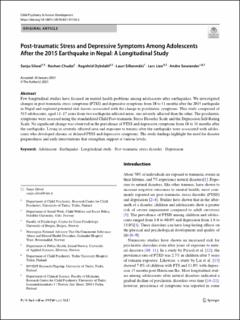| dc.contributor.author | Silwal, Sanju | |
| dc.contributor.author | Chudal, Roshan | |
| dc.contributor.author | Dybdahl, Ragnhild | |
| dc.contributor.author | Sillanmaki, Lauri | |
| dc.contributor.author | Lien, Lars | |
| dc.contributor.author | Sourander, A | |
| dc.coverage.spatial | Nepal | en_US |
| dc.date.accessioned | 2021-09-23T08:54:06Z | |
| dc.date.available | 2021-09-23T08:54:06Z | |
| dc.date.created | 2021-02-23T19:43:04Z | |
| dc.date.issued | 2021-02-19 | |
| dc.identifier.issn | 0009-398X | |
| dc.identifier.issn | 1573-3327 | |
| dc.identifier.uri | https://hdl.handle.net/11250/2780707 | |
| dc.description.abstract | Few longitudinal studies have focused on mental health problems among adolescents after earthquakes. We investigated changes in post-traumatic stress symptoms (PTSS) and depressive symptoms from 18 to 31 months after the 2015 earthquake in Nepal and explored potential risk factors associated with the change in psychiatric symptoms. This study comprised of 515 adolescents, aged 11–17 years from two earthquake-affected areas, one severely afected than the other. The psychiatric symptoms were assessed using the standardized Child Post-traumatic Stress Disorder Scale and the Depression Self-Rating Scale. No signifcant change was observed in the prevalence of PTSS and depressive symptoms from 18 to 31 months after the earthquake. Living in severely afected area and exposure to trauma after the earthquake were associated with adolescents who developed chronic or delayed PTSS and depressive symptoms. The study fndings highlight the need for disaster preparedness and early interventions that strengthen support at various levels. | en_US |
| dc.description.sponsorship | Open access funding provided by University of Turku (UTU) including Turku University Central Hospital. Some of the authors involved in this study received fnancial support: Sanju Silwal from the Jalmari and Rauha Ahokaas Foundation and Finnish Brain Foundation and Andre Sourander from the Academy of Finland Flagship Programme (decision number: 320162), the Strategic Research Council at the Academy of Finland (decision number: 303581) and the Academy of Finland Health from Cohorts and Biobanks Programme (decision number: 308552). | en_US |
| dc.language.iso | eng | en_US |
| dc.publisher | Springer | en_US |
| dc.relation.ispartofseries | Child Psychiatry and Human Development; | |
| dc.rights | Navngivelse 4.0 Internasjonal | * |
| dc.rights.uri | http://creativecommons.org/licenses/by/4.0/deed.no | * |
| dc.subject | Adolescents | en_US |
| dc.subject | Earthquakes | en_US |
| dc.subject | Longitudinal studies | en_US |
| dc.subject | Post-traumatic stress disorders | en_US |
| dc.subject | Depressions | en_US |
| dc.title | Post-traumatic Stress and Depressive Symptoms Among Adolescents After the 2015 Earthquake in Nepal: A Longitudinal Study | en_US |
| dc.type | Peer reviewed | en_US |
| dc.type | Journal article | en_US |
| dc.description.version | publishedVersion | en_US |
| dc.rights.holder | © The Author(s) 2021 | en_US |
| cristin.ispublished | true | |
| cristin.fulltext | original | |
| cristin.qualitycode | 1 | |
| dc.identifier.doi | https://doi.org/10.1007/s10578-021-01136-3 | |
| dc.identifier.cristin | 1892928 | |
| dc.source.journal | Child Psychiatry and Human Development | en_US |
| dc.source.pagenumber | 1-10 | en_US |
| dc.relation.project | Finlands Akademis flaggskeppsprogram: 320162 | en_US |
| dc.relation.project | Rådet för strategisk forskning vid Finlands Akademi: 303581 | en_US |
| dc.relation.project | Suomen Akatemian Terveyttä kohorteista ja biopankeista (COHORT) -akatemiaohjelma: 308552 | en_US |

